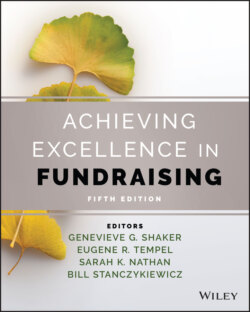Читать книгу Achieving Excellence in Fundraising - Группа авторов - Страница 45
Philosophy of Ethics
ОглавлениеIf public trust is so critical to the nonprofit sector (Independent Sector 2002), then how does one engender trust? Trust is gained by consistently practicing the highest ethics and values (Pribbenow 1994). Ethics is defined as “how a moral person should behave” and values as “the inner judgments that determine how a person actually behaves” (Josephson 2002, 3). The Josephson Institute of Ethics offers the following set of values that inform professional, ethical practice:
1 Honesty,
2 Integrity,
3 Promise keeping,
4 Fidelity and loyalty,
5 Fairness,
6 Caring for others,
7 Respect for others,
8 Responsible citizenship,
9 Pursuit of excellence, and
10 Accountability. (Josephson 2020)
Embracing these values and choosing to do the right thing “takes principled action as well as character worthy of human capacity” (Anderson 1996, 71). A brief primer on moral philosophy – the principles of right and wrong that govern human behavior and guide moral action – offers three traditional approaches to moral thinking. These are the ethics of care, consequentialism, and deontology, also referred to as “care‐based,” “end‐based,” and “rule‐based” philosophies (Kidder 1995, 23–25).
Care‐based ethics advances the “well‐being of care‐givers and care‐receivers in a network of social relations” (Sander‐Staudt 2011, 1). It is often associated with the principle of the Golden Rule found in many of the world's religions, treating others as one wishes to be treated (Kidder 1995), with respect, compassion, and fairness. Its tenets are guided by self‐love and love of humankind (Anderson 1996).
End‐based consequentialism focuses on acting morally to produce the right results (Haines 2006). For Greek philosopher and teleologist Aristotle (384–322 BC), whose virtue ethics underscores the importance of character as fundamental to a moral life, practicing beneficence and justice is paramount (Anderson 1996). For English philosophers Jeremy Benthan (1748–1832) and John Stuart Mill (1806–1873), who promoted a form of consequentialism called utilitarianism, the best overall outcome is one that “maximizes utility” and produces the greatest amount of good for the greatest number (Nathanson 2014, 3).
Rule‐based deontology addresses the concept of duty and acting morally in accordance with universal and impartial “rules that everyone could and should obey” (Jankowiak 2019, 25). German philosopher Immanuel Kant (1724–1804) expresses this theory as the categorical imperative.
These three principles can be applied to the situation faced by medical professionals in 2020 and 2021 when COVID‐19 treatments were hampered by shortages of personnel, equipment, and medication. Doctors guided by care‐based ethics would administer first to the sickest patients while offering compassion to the others. Doctors guided by consequentialism and reasoning that younger patients would have a better chance of surviving would treat them before older patients. Doctors driven by rules might apply a first‐come, first‐served approach to care. In the case of actual guidelines issued during the pandemic, medical ethicists favored the utilitarian principle of maximum benefit (Emanuel et al. 2020).
